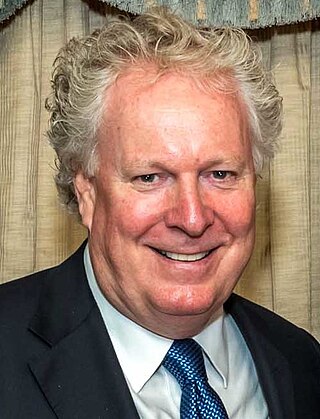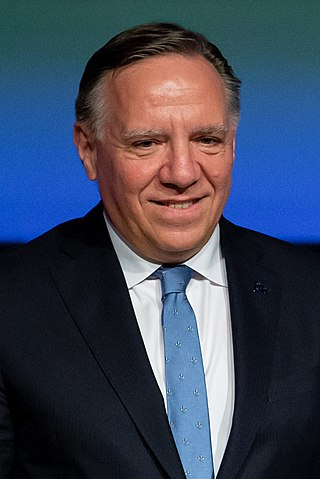Related Research Articles

John James "Jean" Charest is a Canadian lawyer and former politician who served as the 29th premier of Quebec from 2003 to 2012. Prior to that, he was a member of Parliament (MP) between 1984 and 1998. After holding several Cabinet posts from 1986 to 1990 and from 1991 to 1993, he was the leader of the Progressive Conservative Party of Canada from 1993 to 1998.

The Action démocratique du Québec, commonly referred to as the ADQ, was a right-wing populist and conservative provincial political party in Quebec, Canada. On the sovereignty question, it defined itself as autonomist; it had support from nationalists and federalists. Its members were referred to as adéquistes, a name derived from the French pronunciation of the initials 'ADQ'.
Michael Hirsh is a Belgian-born Canadian producer. He has been a significant figure in the Canadian television industry, or more specifically children's programming, since the 1980s, with his most well-known role being the co-founder of animation studio Nelvana.

DHX Cookie Jar Inc. was a Canadian media, production, animation studio, and distribution company. The company was first established in 1976 as CINAR Films Inc., a Montreal-based studio that was heavily involved in children's entertainment. The company's business model, which included the licensing of its properties into educational markets, had a significant impact on its success; by 1999, CINAR held CDN$1.5 billion of the overall children's television market.
The governing Progressive Conservative Party of Canada ran a full slate of 295 candidates in the 1993 federal election, and lost official party status in the House of Commons of Canada by winning only two seats. Many of the party's candidates have their own biography pages; information about others may be found here.
Micheline Charest was a British-born Canadian television producer and founder and former co-chairman of CINAR. In 1997, Charest was ranked 19th in The Hollywood Reporter's list of the 50 most powerful women in the entertainment industry.

François Legault is a Canadian politician serving as the 32nd premier of Quebec since 2018. A founding member of the Coalition Avenir Québec (CAQ), he has led the party since it began in 2011. Legault sits as a member of the National Assembly (MNA) for the Lanaudière region riding of L'Assomption. Legault's ongoing tenure of 5 years, 198 days as premier is the ninth-longest in Quebec history and the longest of any Quebec premier since 2012.
The Jan Wong controversy refers to a claim made by Jan Wong on September 16, 2006, three days after the shooting at Dawson College in Montreal. Canada's nationally distributed newspaper of record, The Globe and Mail, published a front-page article titled, "Get under the desk," by Jan Wong. In the article, Ms. Wong controversially linked all three Quebec school shootings of the last two decades—1989 École Polytechnique Massacre, 1992 Concordia University Massacre, and 2006 Dawson College Shooting —to the purported alienation brought about by "the decades-long linguistic struggle" within the province. Public outcry and political condemnation soon followed in many venues. In response, a Globe and Mail editorial attempted to minimize the controversy as a "small uproar" over journalistic freedom, but this caused further condemnation. Jan Wong maintained her perspective and wrote extensively about the whole experience in her book Out of the Blue, A Memoir of Workplace Depression, Recovery, Redemption and, Yes, Happiness.
Pierre Paradis is a politician in the Canadian province of Quebec. He represented Brome-Missisquoi in the National Assembly of Quebec from 1980 to 2018. A member of the Liberal Party, he served as a cabinet minister in the governments of Robert Bourassa, Daniel Johnson Jr. and Philippe Couillard.
Pierre Reid was a Canadian politician and educator in the province of Quebec. He served in the National Assembly of Quebec from 2003 to 2018, representing Orford as a member of the Quebec Liberal Party. Reid was a former cabinet minister in Jean Charest's government.
The Norbourg scandal is a major financial scandal that took place in 2005. The scandal involved the Montreal, Quebec based Norbourg Financial Group, a trust-fund company founded by Vincent Lacroix. He diverted money from a Norbourg trust fund for personal interests. Nearly 9,200 investors in Quebec lost millions of dollars. It is considered as one of the largest Canadian financial scandals in history and largest in Quebec.

Leonidas Housakos is a Canadian politician who has served as the senator for Wellington, Quebec since January 8, 2009. A member of the Conservative Party, Housakos was appointed on the advice of Prime Minister Stephen Harper. Housakos served as the speaker of the Senate for part of 2015.
The Rizzuto crime family is an organized crime family based in Montreal, Quebec, Canada, whose criminal activity covers most of southern Quebec and Ontario. The United States Federal Bureau of Investigation (FBI) considers the family a faction of the Bonanno crime family, while Canadian and most other international law enforcement agencies recognize it as an independent crime family. The Rizzuto family is sometimes referred to as the Sixth Family.
Antonio Accurso is a Quebec businessman who specializes in the construction sector. He directly and indirectly controls several construction businesses as well as bars, restaurants, movie theatres, shopping centres, and the Hippo Club in Laval.
Normand Cherry was a Canadian politician and union leader in the province of Quebec. He was a Liberal member of the National Assembly of Quebec from 1989 to 1998 and served as a cabinet minister in the governments of Robert Bourassa and Daniel Johnson.
The Commission of Inquiry on the Awarding and Management of Public Contracts in the Construction Industry was a public inquiry in Quebec, Canada into potential corruption in the management of public construction contracts.

Cinar Corp v Robinson is a leading case of the Supreme Court of Canada in the field of copyright law, which has impact in many key aspects of it, including:
AtkinsRéalis is the trading name of SNC-Lavalin Group Inc., a Canadian company based in Montreal that provides engineering, procurement, and construction (EPC) services to various industries, including mining and metallurgy, environment and water, infrastructure, and clean energy. AtkinsRéalis was the largest construction company, by revenue, in Canada, as of 2021.

Element AI was an artificial intelligence company headquartered in Montreal, Quebec. It was funded by the Government of Canada for CAD$5 million, and raised US$102 million independently, before being acquired by ServiceNow. Prior to its acquisition, it had collaborated with Amnesty International, Twitter, Singapore Management University, the Port of Montreal, LG Electronics, and others to release several studies.
Ronald Andrew Weinberg is an American-born Canadian fraudster and former television producer and businessman best known as the co-founder of the CINAR animation studio, and its co-CEO during a scandal that eventually brought down the company. In 2014, he was charged with 26 counts of fraud in Montreal. Two years later, Weinberg was sentenced to nine years in prison.
References
- ↑ Yakabuski, Konrad. "The tattered Cinar legacy is a lesson in humility". The Globe and Mail. Archived from the original on 8 November 2020. Retrieved 20 April 2020.
- ↑ "Cinar verdict sets example for white collar crime". Montreal Gazette. Retrieved 20 April 2020.
- ↑ "Jury finds three accused in Cinar trial guilty of fraud". montrealgazette. Archived from the original on 2017-11-16. Retrieved 2023-04-14.
- ↑ "CINAR sold for $143.9 million US; new owner outlines growth strategy". CBC News . October 31, 2003. Archived from the original on November 7, 2012. Retrieved September 7, 2006.
- ↑ "CINAR turns into Cookie Jar". Variety. 28 March 2004. Archived from the original on 14 March 2017. Retrieved March 14, 2017.
- ↑ "Cinar seeks Nasdaq listing". Variety. Reuters. Archived from the original on 27 November 2021. Retrieved 21 April 2020.
- ↑ Swift, Allan. "CINAR Co-Founders Fined $1 Million Each, Banned From Company For Five Years". Sanford Law Schooenson was awarded $5.2 million in damages, in a suit that resolved a 14-year dispute between the two parties. Archived from the original on 2012-06-28.
- ↑ "CINAR to pay $5.2M for plagiarizing cartoon". Archived from the original on 11 August 2020. Retrieved 20 April 2020.
- ↑ "Norshield CEO led 'cleanup'". Montreal Gazette. Archived from the original on 4 March 2016. Retrieved 21 April 2020.
- ↑ "Cinar to pay $5.2M for plagiarizing cartoon". CBC News. August 26, 2009. Archived from the original on December 24, 2013. Retrieved August 27, 2009.
- ↑ "Montreal animator wins $5.2M in copyright battle". Montreal Gazette. August 26, 2009. Archived from the original on August 30, 2009. Retrieved August 27, 2009.
- ↑ "Arrest warrant issued for Cinar co-founder Ronald Weinberg". Montreal. March 2, 2011. Archived from the original on May 21, 2021. Retrieved August 23, 2020.
- ↑ "Former CA sentenced to four years in jail". The Gazette. Archived from the original on January 12, 2016. Retrieved November 8, 2015.
- ↑ Delean, Paul. "Fraud trial of CINAR founder Ronald Weinberg and investment execs begins in Quebec Superior Court". The Montreal Gazette . Archived from the original on May 13, 2014.
- ↑ Marotte, Bertrand; Van Praet, Nicolas (June 2, 2016). "CINAR founder Ronald Weinberg, two others found guilty on fraud charges". The Globe and Mail . Archived from the original on May 3, 2017. Retrieved September 16, 2022.
- ↑ Marotte, Bertrand (June 22, 2016). "Cinar founder Weinberg given nearly nine years in fraud case". The Globe and Mail . Archived from the original on September 20, 2022. Retrieved September 16, 2022.
- ↑ "Cinar founder Ronald Weinberg gets full parole on 9-year sentence". Montreal Gazette. Archived from the original on 2020-06-06. Retrieved 2020-08-18.
- ↑ Yakabuski, Konrad (June 23, 2016). "The tattered Cinar legacy is a lesson in humility". The Globe and Mail . Archived from the original on November 8, 2020. Retrieved August 18, 2020.